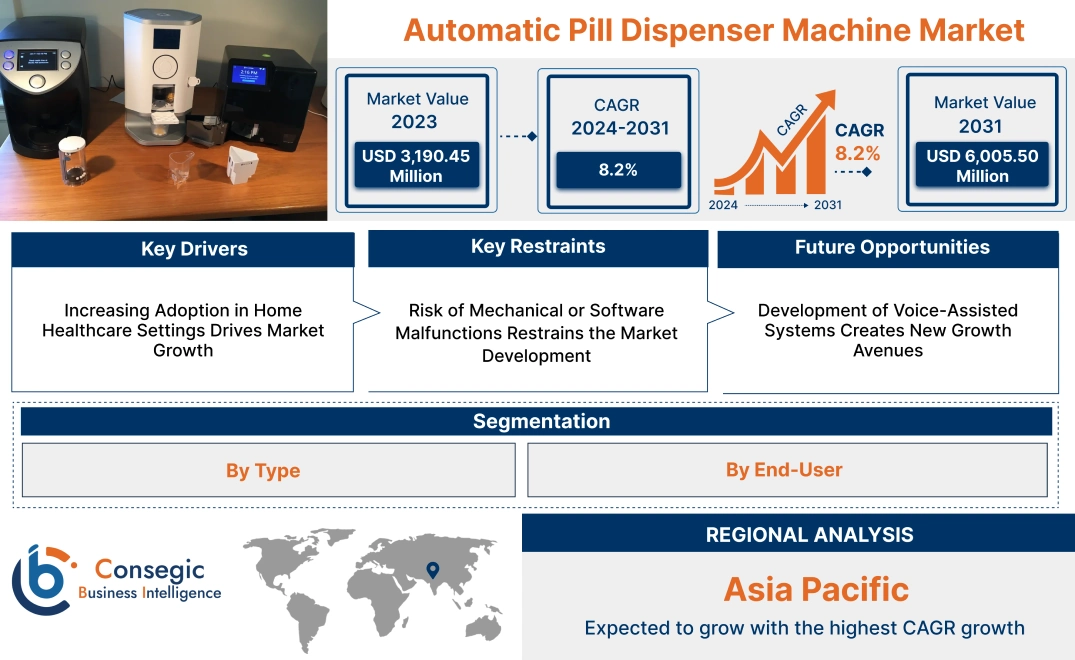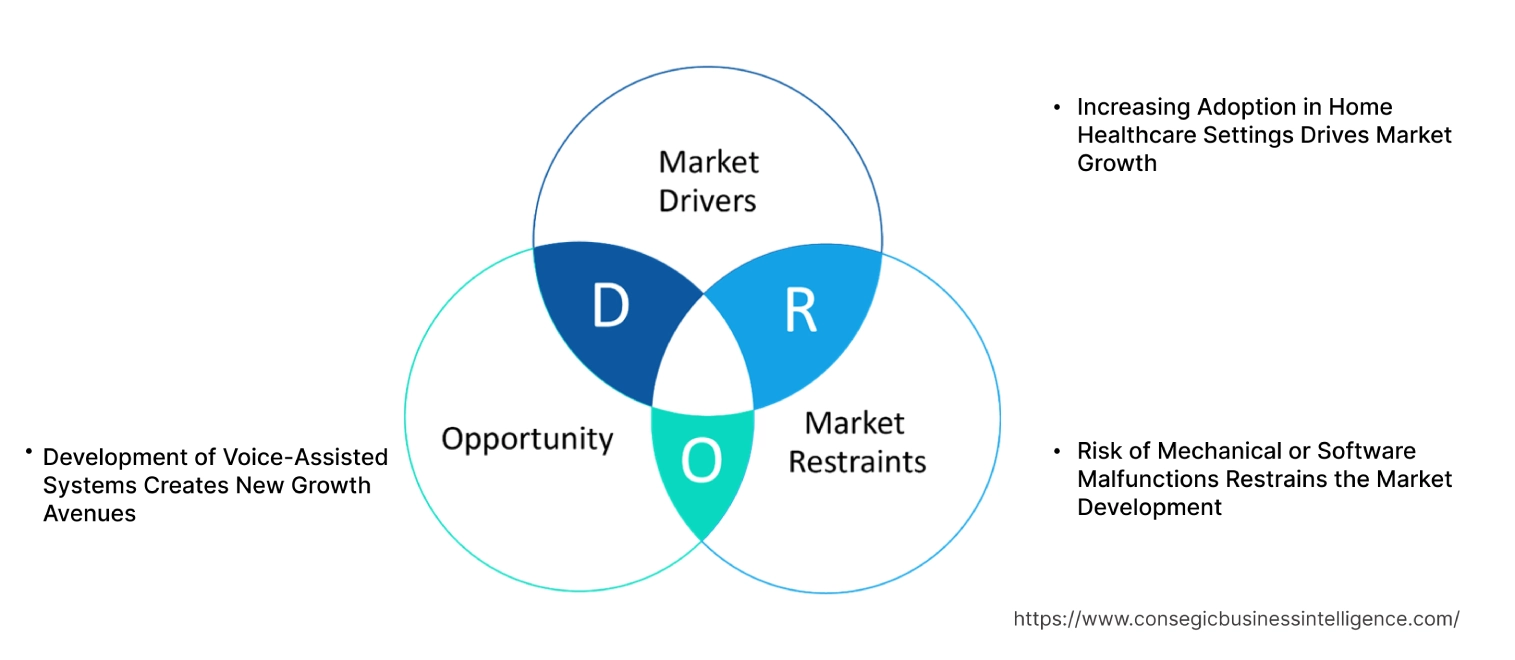- Summary
- Table Of Content
- Methodology
Automatic Pill Dispenser Machine Market Size:
Automatic Pill Dispenser Machine Market size is estimated to reach over USD 6,005.50 Million by 2031 from a value of USD 3,190.45 Million in 2023 and is projected to grow by USD 3,396.11 Million in 2024, growing at a CAGR of 8.2% from 2024 to 2031.
Automatic Pill Dispenser Machine Market Scope & Overview:
An automatic pill dispenser machine is a specialized device designed to organize, store, and dispense medications accurately and efficiently according to a predefined schedule. These machines are widely used in healthcare facilities, pharmacies, and home care settings to enhance medication adherence and reduce the risk of errors. They feature compartments or trays to store pills and are equipped with timers, alarms, and automated dispensing mechanisms to ensure timely medication delivery.
These machines are available in various configurations, ranging from compact, portable units for individual use to larger systems designed for clinical and pharmacy operations. Advanced automatic pill dispensers integrate smart technologies, such as programmable settings, remote monitoring, and compatibility with healthcare management systems, enabling seamless operation and better medication management. They are built for precision and reliability, offering a user-friendly interface and secure storage to prevent tampering.
End-users of these machines include hospitals, nursing homes, and individual patients, where efficient medication management is critical to ensuring patient safety and improving treatment outcomes. These devices play an essential role in streamlining healthcare operations and supporting effective medication administration.
Key Drivers:
Increasing Adoption in Home Healthcare Settings Drives Market Growth
The increasing focus on home healthcare solutions is significantly driving the adoption of automated medication dispensers. These devices empower patients, particularly those with chronic conditions, to manage their medications independently, minimizing reliance on caregivers and reducing the need for frequent hospital visits. Automated dispensers ensure timely and accurate medication delivery, which is critical for improving treatment adherence and overall health outcomes.
As healthcare systems globally shift toward cost-effective, decentralized care models, the demand for these devices is rising. Their integration into home healthcare strategies aligns with trends in personalized medicine, where patient-centered solutions are prioritized. Additionally, their usability among the elderly and individuals with cognitive impairments makes them an essential tool in enhancing home-based medical care. The automatic pill dispenser machine market growth is further supported by the increasing availability of technologically advanced dispensers that offer features such as remote monitoring and real-time alerts, catering to the needs of modern healthcare frameworks.
Key Restraints :
Risk of Mechanical or Software Malfunctions Restrains the Market Development
Automated pill dispensers, while offering convenience and improved medication adherence, are not immune to mechanical or software malfunctions. Mechanical issues, such as jams or incorrect pill dispensing, can disrupt medication schedules and lead to patient frustration or non-compliance. Similarly, software glitches, including system crashes or errors in dosage programming, pose significant risks to patient safety. Connectivity problems in smart dispensers, particularly those relying on IoT-enabled features, can further hinder their reliability, preventing timely alerts or remote monitoring. Such malfunctions not only compromise the primary function of these devices but also erode trust among users and healthcare providers. In critical healthcare scenarios, any delay or error in medication delivery can have severe consequences, particularly for patients with chronic or life-threatening conditions. These risks restrain the automatic pill dispenser machine market demand highlighting the need for robust quality control and regular maintenance to ensure the reliability and safety of automated pill dispenser systems.
Future Opportunities :
Development of Voice-Assisted Systems Creates New Growth Avenues
The integration of voice-activated features in automated pill dispensers is revolutionizing medication management, especially for elderly and visually impaired individuals. Voice-assisted systems enable users to dispense medications, set reminders, and receive alerts through simple voice commands, eliminating the need for manual input or reliance on visual cues. This technology enhances accessibility, making medication management easier for individuals with physical or cognitive limitations.
Additionally, voice features can be programmed in multiple languages, catering to diverse user demographics and broadening market appeal. For caregivers, these systems provide added convenience by ensuring that patients receive timely reminders without constant supervision. As healthcare trends increasingly emphasize patient-centric and inclusive solutions, the adoption of voice-enabled pill dispensers is expected to grow. By addressing usability challenges, these advancements open a new window of opportunities for manufacturers to cater to underserved segments, such as aging populations and those with disabilities, while improving medication adherence and overall patient outcomes. Thus, the aforementioned factors boost the automatic pill dispenser machine market opportunities.
Automatic Pill Dispenser Machine Market Segmental Analysis :
By type:
Based on type, the market is segmented into centralized automatic pill dispenser machines and decentralized automatic pill dispenser machines.
The centralized automatic pill dispenser machines segment held the largest revenue of the total automatic pill dispenser machine market share in 2023.
- Centralized machines are primarily used in large healthcare facilities, such as hospitals and long-term care centers, due to their high capacity and advanced automation capabilities.
- These machines streamline the medication dispensing process, improving operational efficiency and reducing errors in high-demand environments.
- Centralized systems support inventory management and are integrated with electronic health record (EHR) systems, ensuring seamless monitoring of patient medication history.
- The market analysis shows that the dominance of this segment is attributed to its ability to handle bulk dispensing needs while enhancing patient safety and operational efficiency, fueling the automatic pill dispenser machine market expansion.
The decentralized automatic pill dispenser machines segment is expected to register the fastest CAGR during the forecast period.
- Decentralized machines are increasingly adopted in homecare and small healthcare settings for their portability and user-friendly interface.
- These machines are equipped with smart features such as real-time alerts, dose reminders, and remote monitoring, improving medication adherence for patients with chronic conditions.
- Their compact design and ease of use make decentralized machines ideal for individual and small-scale usage, especially in regions with growing demand for home-based healthcare solutions.
- As per automatic pill dispenser machine market analysis, the rapid adoption of decentralized systems reflects their role in supporting patient-centric healthcare trends and improving medication compliance in diverse environments.
By End-User:
Based on end-users, the market is segmented into hospitals, clinics, long-term care facilities, and home care settings.
The hospital's segment accounted for the largest revenue of 38.70% of the total automatic pill dispenser machine market share in 2023.
- Hospitals rely on automatic pill dispenser machines to manage high patient volumes, ensuring accurate medication administration and reducing the workload of healthcare professionals.
- These systems enhance efficiency in inpatient care by automating the dispensing process and minimizing medication errors, particularly in critical care units.
- The integration of advanced technologies, such as barcode scanning and IoT-enabled tracking, further drives adoption in hospitals seeking improved patient outcomes.
- As per the automatic pill dispenser machine market trends, the dominance of this segment is supported by the high capacity and comprehensive functionalities of automatic dispensers tailored to hospital operations.
The homecare settings segment is expected to register the fastest CAGR during the forecast period.
- Homecare settings increasingly adopt automatic pill dispenser machines to support elderly patients and individuals with chronic diseases, ensuring timely and accurate medication adherence.
- These machines are equipped with advanced features such as dose reminders, caregiver alerts, and remote monitoring, enhancing patient compliance and reducing healthcare costs.
- The growth in preference for at-home healthcare solutions, coupled with the rising aging population, drives the demand for user-friendly and compact dispensers in this segment.
- As per the market analysis, the segment’s growth is further fueled by advancements in portable and AI-enabled machines that cater to personalized healthcare requirements, creating significant automatic pill dispenser machine market opportunities.
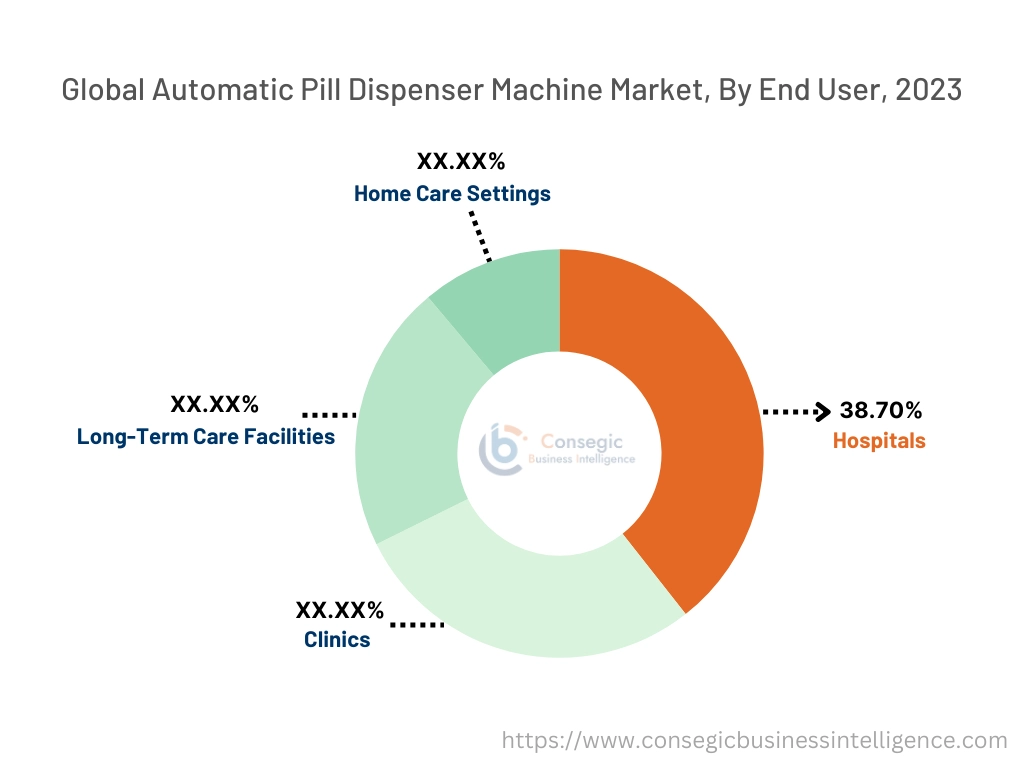
Regional Analysis:
The regions covered are North America, Europe, Asia Pacific, the Middle East and Africa, and Latin America.
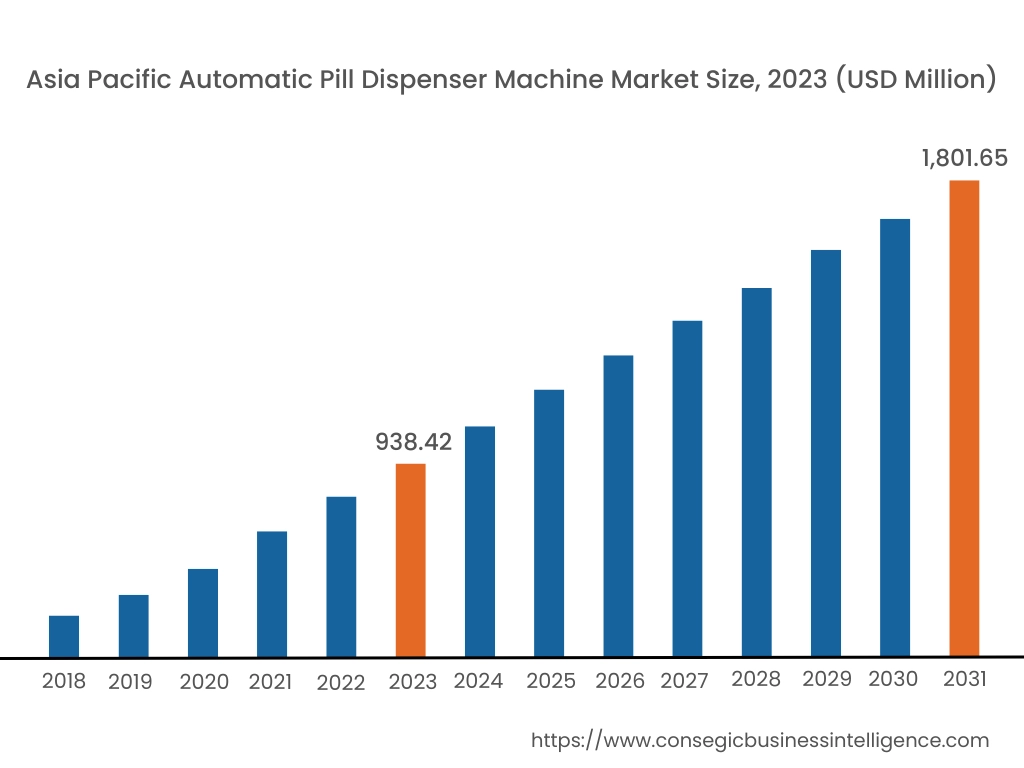
Asia Pacific region was valued at USD 938.42 Million in 2023. Moreover, it is projected to grow by USD 1,000.57 Million in 2024 and reach over USD 1,801.65 Million by 2031. Out of these, China accounted for the largest share of 31.1% in 2023. The Asia-Pacific region is experiencing rapid growth in the automatic pill dispenser machine market, driven by increasing healthcare awareness and technological advancements in countries such as China, Japan, and India. As per automatic pill dispenser machine market analysis, the trend towards home healthcare solutions is particularly prominent, addressing the needs of a growing elderly population.
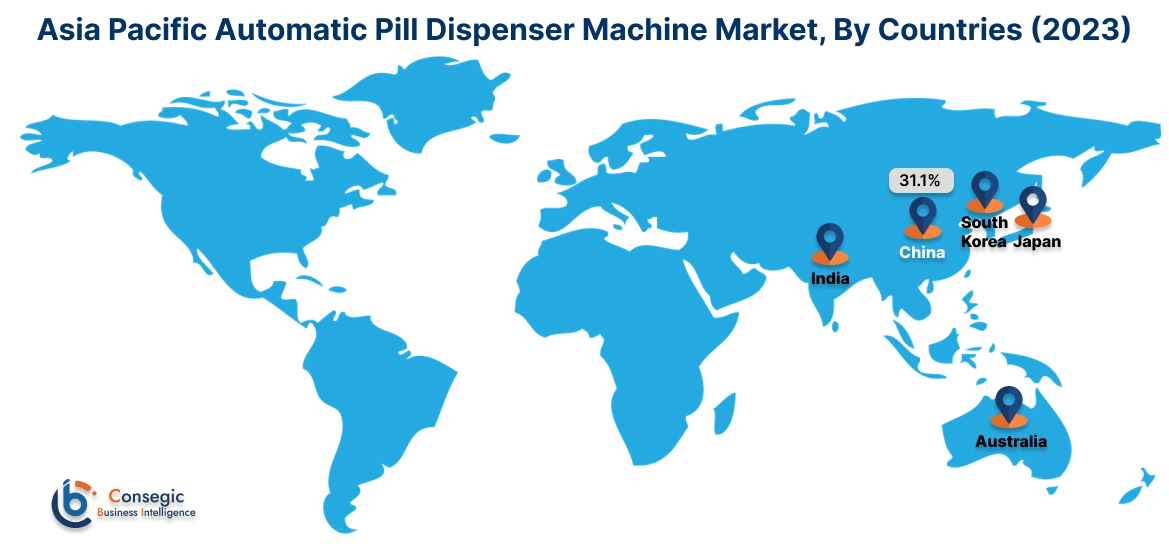
North America is estimated to reach over USD 1,975.81 Million by 2031 from a value of USD 1,060.48 Million in 2023 and is projected to grow by USD 1,127.88 Million in 2024. This region holds a significant share of the market, driven by an aging population and a well-established healthcare system. The United States, in particular, has seen widespread adoption of automatic pill dispensers in both hospital and home healthcare settings. The trend towards integrating these devices with electronic health records (EHR) systems is notable, enhancing medication adherence and reducing errors, which contributes to the automatic pill dispenser machine market growth.
Europe represents a substantial share of the global market, with countries like Germany, France, and the United Kingdom leading in implementation. The region's focus on patient safety and efficient healthcare delivery has propelled the automatic pill dispenser machine market expansion. Analysis indicates a growth in the trend towards decentralized dispensing systems in hospital pharmacies, aiming to streamline operations and improve patient outcomes.
The Middle East & Africa region shows a growing interest in automatic pill dispenser machines, particularly in urban centers where healthcare modernization is underway. As per the market analysis, an increasing trend towards adopting these devices in private healthcare facilities to enhance medication management drives the automatic pill dispenser machines market demand.
Latin America is an emerging market for automatic pill dispenser machines, with Brazil and Mexico being key contributors. The region's efforts to improve healthcare services and patient compliance have led to the consideration of automated dispensing solutions. The automatic pill dispenser machine market trends indicate a shift towards digital health initiatives is also gaining momentum, aiming to integrate technology into patient care.
Automatic Pill Dispenser Machine Market Competitive Landscape:
The automatic pill dispenser machine market is highly competitive with major players providing products and services to the national and international markets. Key players are adopting several strategies in research and development (R&D), product innovation, and end-user launches to hold a strong position in the global automatic pill dispenser machine market. Key players in the automatic pill dispenser machine industry include -
- Becton, Dickinson, and Company (USA)
- Capsa Healthcare (USA)
- Yuyama Co., Ltd. (Japan)
- Koninklijke Philips N.V. (Netherlands)
- Hero Health, Inc. (USA)
- Oracle Health (USA)
- McKesson Corporation (USA)
- Omnicell, Inc. (USA)
- ScriptPro LLC (USA)
- Swisslog Healthcare (Switzerland)
Recent Industry Developments :
Product Launches:
- In June 2023, CVS Pharmacy introduced the CVS Health QuickServe Vitamin Dispensing System, a countertop device that organizes a 30-day supply of select vitamins and supplements. This system aims to simplify routines and improve adherence by eliminating pill bottle clutter and keeping supplements easily accessible. A recent CVS survey found that 75% of Americans have forgotten to take their vitamins in the past year, highlighting the need for such solutions.
Automatic Pill Dispenser Machine Market Report Insights :
| Report Attributes | Report Details |
| Study Timeline | 2018-2031 |
| Market Size in 2031 | USD 6,005.50 Million |
| CAGR (2024-2031) | 8.2% |
| By Type |
|
| By End-user |
|
| By Region |
|
| Key Players |
|
| North America | U.S. Canada Mexico |
| Europe | U.K. Germany France Spain Italy Russia Benelux Rest of Europe |
| APAC | China South Korea Japan India Australia ASEAN Rest of Asia-Pacific |
| Middle East and Africa | GCC Turkey South Africa Rest of MEA |
| LATAM | Brazil Argentina Chile Rest of LATAM |
| Report Coverage |
|
Key Questions Answered in the Report
What is the size of the Automatic Pill Dispenser Machine Market? +
Automatic Pill Dispenser Machine Market size is estimated to reach over USD 6,005.50 Million by 2031 from a value of USD 3,190.45 Million in 2023 and is projected to grow by USD 3,396.11 Million in 2024, growing at a CAGR of 8.2% from 2024 to 2031.
What are the key segments in the Automatic Pill Dispenser Machine Market? +
The Automatic Pill Dispenser Machine Market is segmented by type (centralized automatic pill dispenser machines, decentralized automatic pill dispenser machines), end-user (hospitals, clinics, long-term care facilities, homecare settings), and region (Asia-Pacific, Europe, North America, Latin America, Middle East & Africa).
Which region is expected to dominate the Automatic Pill Dispenser Machine Market? +
The Asia-Pacific region is expected to dominate the Automatic Pill Dispenser Machine Market, driven by increasing healthcare awareness, technological advancements, and the growing elderly population, particularly in countries such as China, India, and Japan, which are adopting home healthcare solutions.
Who are the key players in the Automatic Pill Dispenser Machine Market? +
Key players in the Automatic Pill Dispenser Machine Market include Becton, Dickinson and Company (USA), Capsa Healthcare (USA), Oracle Health (USA), McKesson Corporation (USA), Omnicell, Inc. (USA), ScriptPro LLC (USA), Swisslog Healthcare (Switzerland), Yuyama Co., Ltd. (Japan), Koninklijke Philips N.V. (Netherlands), and Hero Health, Inc. (USA).
